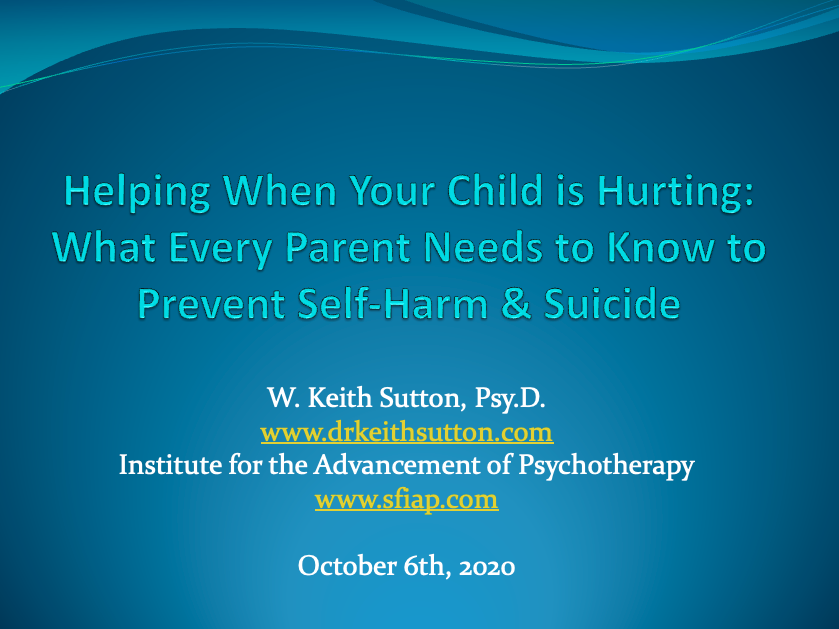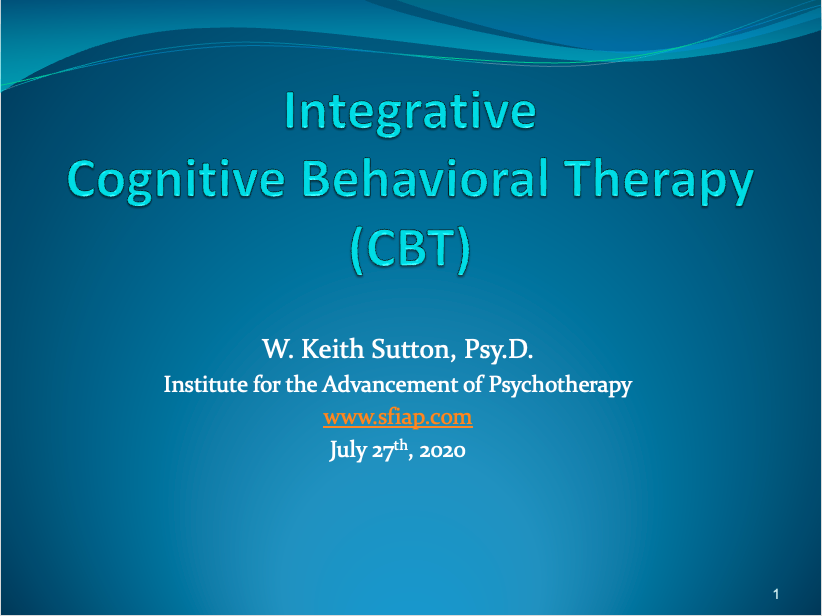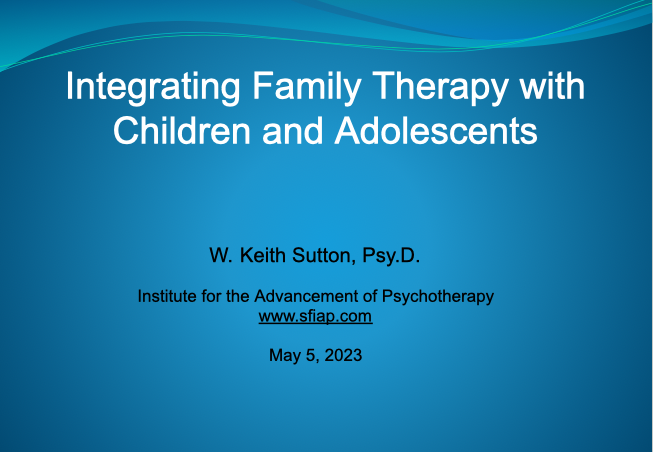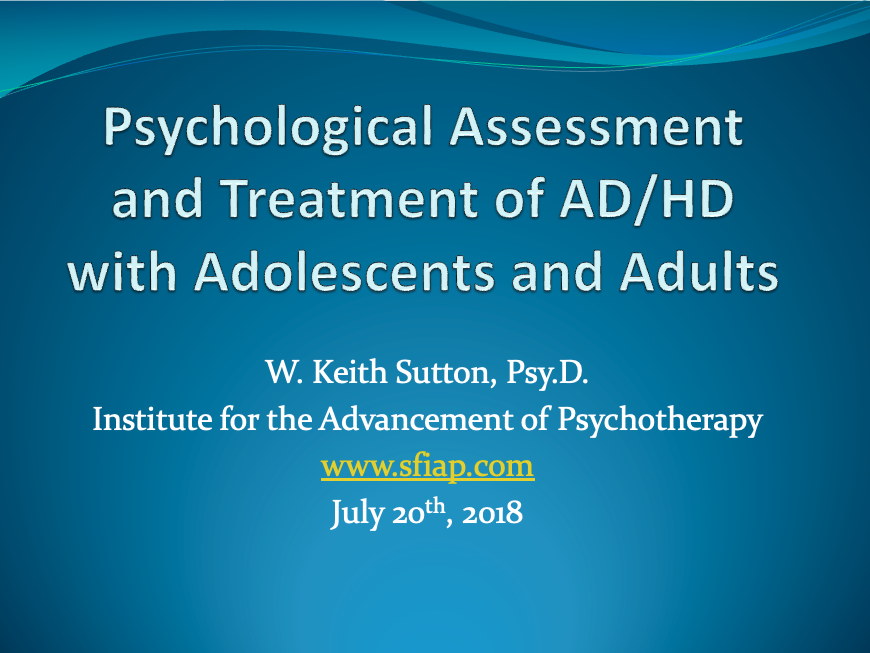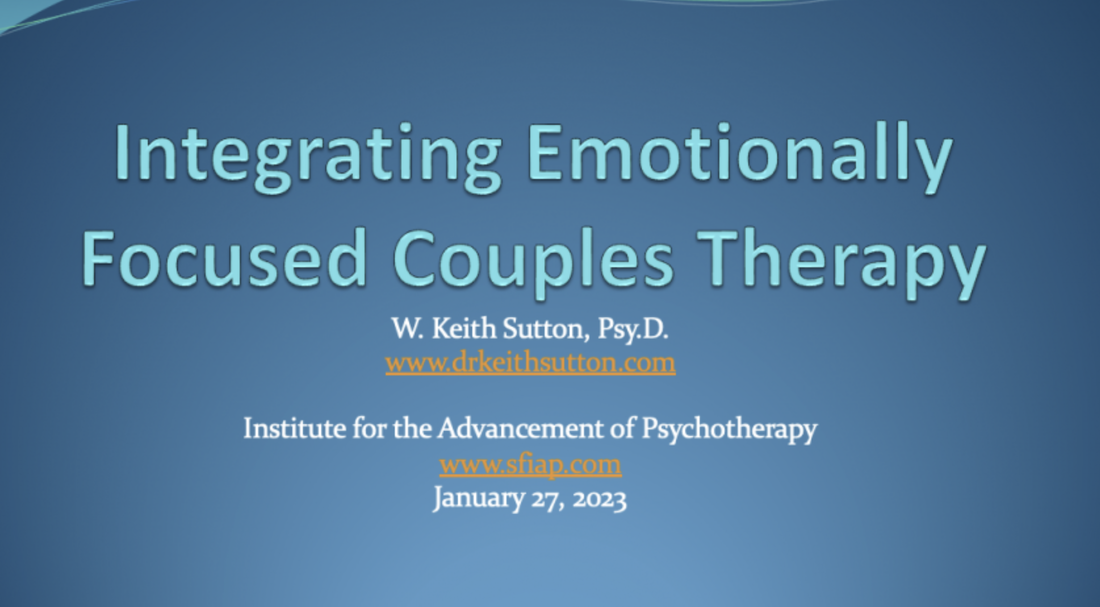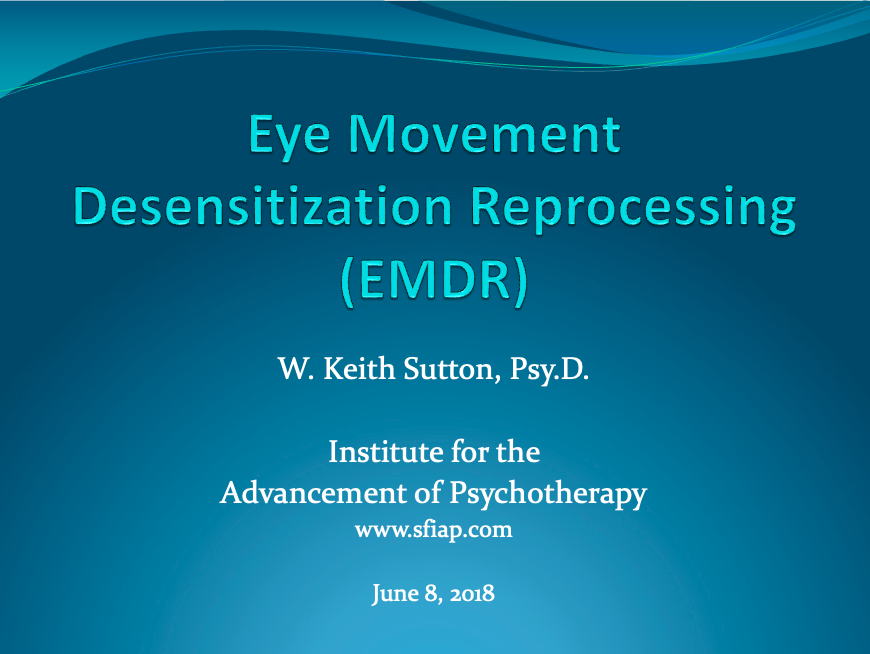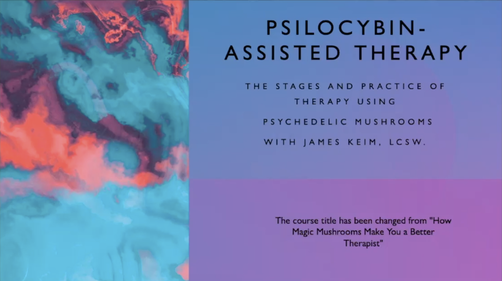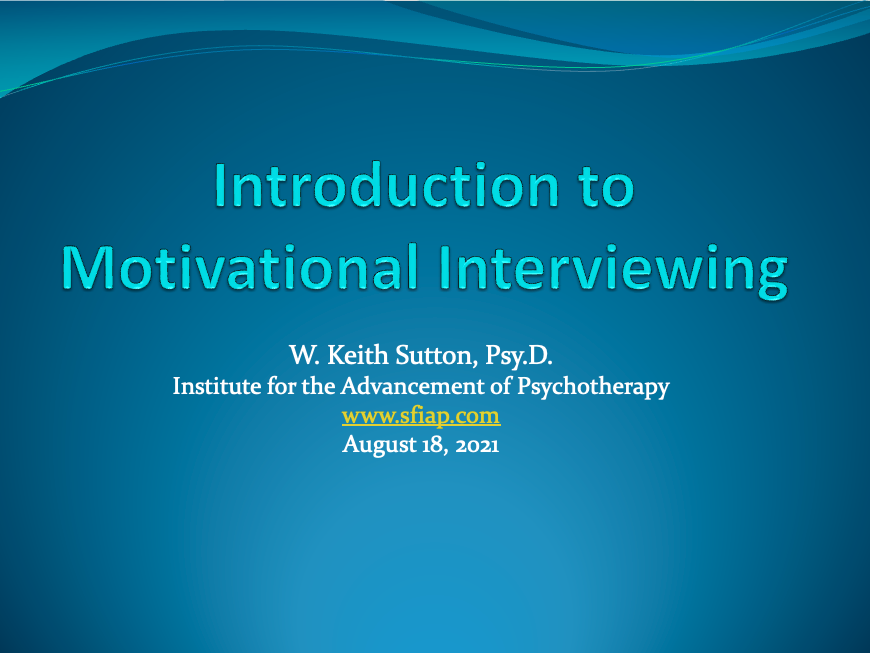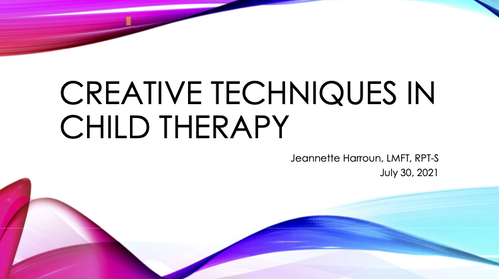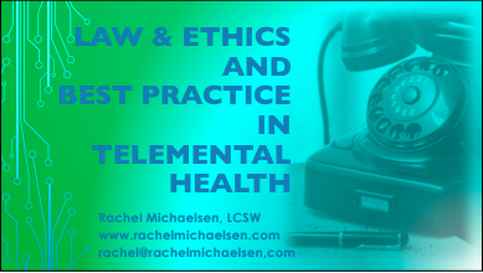On Demand Workshops for Professionals
For information regarding workshop accommodations, and cancellation/refund policies, visit sfiap.com/faqs.
|
Helping When Your Child Is Hurting: What Every Parent Needs to Know to Prevent Adolescent Self-Harm & Suicide with W. Keith Sutton, Psy.D.
Anxiety rates for adolescents are on the rise, and so is self-harm and suicide. Losing a child is a parent’s worst nightmare. Dr. Sutton will explain the potential causes of adolescent anxiety and depression, why some kids self-harm, and factors that can lead to suicide or suicidal behavior. He’ll discuss effective treatments and how parents can help their depressed children overcome their pain. |
|
What You’ll Learn:
|
Rental Price
|
|
Integrative Cognitive Behavioral Therapy (CBT) with W. Keith Sutton, Psy.D.
There is no question today that Cognitive-Behavioral Therapy is an important tool in a clinician's toolbox. Significant empirical research has demonstrated its effectiveness with issues such as depression, anxiety, substance abuse, phobias, panic disorder, OCD, ADHD, social phobia, and other issues. At IAP, we view CBT as a general theory influenced by Aaron Beck's Cognitive Therapy (CT), Behavioral Theory, and Ellis' Rational Emotive Behavioral Therapy (REBT). This general theory provides a structure for a number of interventions culled from a variety of theoretical sources to improve treatment effectiveness. These sources include Dialectic Behavioral Therapy, Schema Therapy, Acceptance Commitment Therapy, Prolonged Exposure, Exposure with Response Prevention, Eye Movement Desensitization Reprocessing, Narrative Therapy, Solution Focused Therapy, Gestalt Therapy, and others. |
Rental Price
|
|
Integrating Family Therapy with Children and Adolescents with W. Keith Sutton, Psy.D.
There has been significant research to show that family therapy is an effective treatment for working with children and adolescents, but many therapists don't provide family therapy because they feel undertrained or intimidated by working with more than one client at a time. In this workshop, we will ground ourselves in the family systems theoretical orientation, to see how it can inform case conceptualization of families and larger systems (e.g., extended family, community, schools, organizations). We will review core concepts in family therapy that guide assessment and treatment. We review principles of Behavioral Family Therapy, Attachment Based Family Therapy, Structural Family Therapy, Strategic Family Therapy, and how to use these principals to create lasting change in families, and provide tools in order for the therapist to know where they are and where they’re going when working with families. We will discuss various disorders (e.g., depression, anxiety, ADHD, oppositional defiant disorder, eating disorders), and how these principles can help in creating lasting change, and additionally understanding how high Expressed Emotion is key in relationship to relapse prevention. |
Rental Price
|
|
Assessment and Treatment of ADHD in Children, Adolescents, and Adults with W. Keith Sutton, Psy.D.
Many therapists are familiar with AD/HD, but do not feel comfortable diagnosing it or treating it in therapy. Treating adults and adolescents with AD/HD in therapy involves a combination of coaching, using the therapeutic relationship as a way of healing, and helping the clients to recognize the effects AD/HD has had on them so they can change their relationship with it. In addition to the individual work, most clients with ADHD also require thinking and working systemically, whether with the family, partner, school, or work. In this two hour workshop, we will review how to assess and diagnose AD/HD in adults and adolescents, how to treat AD/HD in adults and adolescents using Cognitive Behavioral Therapy, review an evidence based treatment for adult AD/HD, understand how AD/HD affects family and couples relationships, and discuss the art of working with adults and adolescents with AD/HD. |
Rental Price
|
|
Integrating Emotionally Focused Couples Therapy (EFT) with W. Keith Sutton, Psy.D.
Using Emotionally Focused Couples Therapy (EFT) as a theoretical basis, Dr. Sutton will provide an introduction to EFT theory, and discuss how to integrate knowledge from Gottman research, and techniques from Cognitive Behavioral Therapy (CBT) and Eye Movement Desensitization Reprocessing when working with individual issues in a couples context such as ADHD, OCD, panic disorder, and trauma. EFT is an effective, evidence based approach to working with couples. Research studies have found that 70-73% of couples move from distress to recovery and 86% show significant improvements when treated with EFT. This collaborative approach mixes experiential Rogerian techniques with structural, systemic interventions that extend the ideas of attachment theory to romantic relationships. Advances in the study of emotional regulation support EFT's use of emotion as a primary source of information to the self and to others about needs and motives as a primary route to connecting with attachment figures. With the theoretical grounding of EFT, we will discuss how to move between working with individual issues and incorporating partners into treatment, and how to treat individual issues within the context of couples therapy when the clients can not afford multiple therapists. We will also discuss how to use knowledge from other couples therapy approaches (e.g., Gottman, Languages of Love, Behavioral Couples Therapy, Strategic Couples Therapy, sex therapy), and how they can inform our treatment using EFT with couples.
|
Rental Price
|
|
Introduction to EMDR with W. Keith Sutton, Psy.D.
Eye Movement Desensitization Reprocessing (EMDR) has been found to be an effective treatment for trauma. There is controversy surrounded the mechanisms of action in EMDR, but the research shows and the clinicians who use it find it very effective. It incorporates elements of cognitive therapy in its focus on cognitions and use of cognitive interweaves, dynamic therapy in its use of free association and catharsis, neurolinguistic programing in its use of distancing techniques, behavioral therapy in its use of imaginal exposure, and elements from other approaches. Dr. Sutton will teach the theory and techniques of EMDR, and discuss how to apply it to working with trauma and also how to integrate EMDR into everyday practice for a variety of other issues that aren't trauma based. In this video, you will see a client go through the process of EMDR, showing the process and techniques in action. |
Rental Price
|
|
Psilocybin-Assisted Psychotherapy: How Psychedelic Mushrooms Increases Neuroplasticity and Receive a Classification of Breakthrough Treatment by the FDA with James Keim, LCSW
This workshop will review research and best practices in psilocybin-assisted psychotherapy. Included in our discussion will be how psilocybin can make us better therapists, in addition to being a useful experience for our clients. Concepts of neuroplasticity, memory reconsolidating, and preparation for practice and integration will be discussed as well. James Keim, LCSW is the founder of Mimosa Therapeutics, Inc., which uses bioreactors to grow research grade, natural psilocybin, rather than the synthetic psilocybin which is most widespread. He was the clinical director for Jay Haley and Cloe Madanes, the developers of Strategic Family Therapy, has published his work on Oppositional Defiant Disorder, and heads the Institute for the Advancement of Psychotherapy's Oppositional and Conduct Disorder Clinic. James Keim in addition to teaching at the IAP, also teaches family therapy in Vietnam, Cambodia, and Thailand. |
Rental Price
|
|
Introduction to Motivational Interviewing with W. Keith Sutton, Psy.D.
There has been considerable research to show that the relationship between the therapist and client accounts for the majority of the variance in therapy outcomes. Motivational interviewing has been found to be an effective approach to treating alcohol and substance abuse disorders and many other mental health and physical health problems. It is a clinical method or style that is effective in assisting clients to make difficult changes in their lives. It is considered a trans-theoretical model as it is compatible with various theoretical approaches. Learning motivational interviewing can improve client's motivation and therapists' ability to connect with their client and build a better therapeutic relationship. Motivational Interviewing is both client centered and directive. The goal is to discover and enhance a client's intrinsic motivation to change. This workshop will review the Stages of Change and introduce the spirit, principles and strategies of the Motivational Interviewing method. |
Rental Price
|
|
Creative Techniques in Child Therapy with Jeannette Harroun, LMFT, RFT-S
It is said that you can’t enter any world for which you don’t have the language[i] and that is particularly true in working with children. Play is a child’s language and both play and expressive arts techniques provide an effective means for therapeutic work with children. Many play therapy techniques are evidence-based and effectively integrated with a variety of theoretical perspectives. In today’s two hour workshop we will explore approaches to play therapy, the healing benefits of play and interventions to successfully engage and support children and families in addressing concerns including depression, anxiety, self-regulation and trauma. The class will include both didactic instruction, roleplays and activities with other participants. [i] Ludwig Wittgenstein, Philosopher Jeannette Harroun, LMFT, RPT-S is a Marriage and Family Therapist and Registered Play Therapist-Supervisor. She has a private practice in Lafayette, CA where she provides psychotherapy and individual consultation and supervision. Her approach to therapy is described as positive, warm and playful. She strongly believes in the power of play in helping children and teens better understand and express themselves. She regularly uses play to address a variety of concerns including anxiety, self-regulation, self-esteem, attachment, tantrums and impulsivity, anxiety, depression, school and motivational issues, trauma, and divorce. She also enjoys supervising and mentoring others, providing consultation and supervision to other professionals. She is currently a collaborative supervisor for the Wright Institute and has taught at both the University of Phoenix and John F. Kennedy University. |
Rental Price
|
|
Legal and Ethics Issues and Best Practices in Telemental Health with Rachel Michaelsen, LCSW
As online mental health treatment becomes part of many providers' service provision, it is important that they are aware of the legal and ethical issues related to telemental health. In this class participants will learn: 1) California Telehealth legal codes and Telehealth professional codes of ethics including: informed consent, privacy, working with people out of state, preparing for crisis, and handling technology failure; 2) research on Telemental Health and 3) best practicing when providing online mental health services. Rachel Michaelsen, LCSW, is a clinical social worker who has worked in HMOs, public agencies, and private practice as both a mental-health provider and a supervisor for over thirty years. Her mental health practice has been exclusively via telehealth since March of 2020. She has taught courses in Telemental Health, diagnosis, clinical supervision, law and ethics, childhood psychopathology, time management, vicarious traumatization and energy psychology at universities, conferences, and mental-health agencies. She is a California Association for Marriage and Family Certified Supervisor and has a Certificate in Advanced Supervision from Smith College School for Social Work. |
Continuing Education
CE's are available for a majority of our workshops. Sign up below to be notified when new workshops are added!
|
|
Information on Continuing Education Credit for Health Professionals
• CE credits for psychologists are provided by the Institute for the Advancement of Psychotherapy (IAP) which is sponsoring this program. The Institute for the Advancement of Psychotherapy is approved by the American Psychological Association to sponsor continuing education for psychologists. The Institute for the Advancement of Psychotherapy maintains responsibility for this program and its content.
• The California Board of Behavioral Sciences accepts CE credits for LCSW, LPCC, LEP, and LMFT license renewal for programs offered by approved sponsors of CE by the American Psychological Association.
• LCSW, LPCC, LEP, and LMFTs, and other mental health professionals from states other than California need to check with their state licensing board as to whether or not they accept programs offered by approved sponsors of CE by the American Psychological Association.
• For questions about receiving your Certificate of Attendance, or about CE, contact the Institute for the Advancement of Psychotherapy at [email protected].
• The California Board of Behavioral Sciences accepts CE credits for LCSW, LPCC, LEP, and LMFT license renewal for programs offered by approved sponsors of CE by the American Psychological Association.
• LCSW, LPCC, LEP, and LMFTs, and other mental health professionals from states other than California need to check with their state licensing board as to whether or not they accept programs offered by approved sponsors of CE by the American Psychological Association.
• For questions about receiving your Certificate of Attendance, or about CE, contact the Institute for the Advancement of Psychotherapy at [email protected].
For More Information Contact Us At [email protected] or (415) 617-5932
|
|
Upcoming Live Trainings |
|
Information on Continuing Education Credit for Health Professionals
• CE credits for psychologists are provided by the Institute for the Advancement of Psychotherapy (IAP) which is sponsoring this program. The Institute for the Advancement of Psychotherapy is approved by the American Psychological Association to sponsor continuing education for psychologists. The Institute for the Advancement of Psychotherapy maintains responsibility for this program and its content.
• The California Board of Behavioral Sciences accepts CE credits for LCSW, LPCC, LEP, and LMFT license renewal for programs offered by approved sponsors of CE by the American Psychological Association.
• LCSW, LPCC, LEP, and LMFTs, and other mental health professionals from states other than California need to check with their state licensing board as to whether or not they accept programs offered by approved sponsors of CE by the American Psychological Association.
• For questions about receiving your Certificate of Attendance, or about CE, contact the Institute for the Advancement of Psychotherapy at [email protected].
• The California Board of Behavioral Sciences accepts CE credits for LCSW, LPCC, LEP, and LMFT license renewal for programs offered by approved sponsors of CE by the American Psychological Association.
• LCSW, LPCC, LEP, and LMFTs, and other mental health professionals from states other than California need to check with their state licensing board as to whether or not they accept programs offered by approved sponsors of CE by the American Psychological Association.
• For questions about receiving your Certificate of Attendance, or about CE, contact the Institute for the Advancement of Psychotherapy at [email protected].
*There will be a dog present with Dr. Sutton at all in person trainings.
|
|
phone |

